Acquisition of territory by force, persecution, racial discrimination and apartheid, denial of self-determination – these are the crimes Israel has committed against the Palestinian people, Palestinian Foreign Minister Riyad al-Maliki told the International Court of Justice this morning, in the Dutch administrative capital, The Hague, on the first day of Advisory Opinion hearings on the legality of Israel’s prolonged occupation of the Palestinian territories.
“For over a century, the inalienable right of the Palestinian people to self-determination has been denied and violated – their very existence negated,” al-Maliki told the court, flanked by Palestine’s 25-member delegation, many of them draped in keffiyehs.
“Palestine was not a land without a people,” al-Maliki added, the court’s fifteen justices listening closely.
“It was not, as Israeli leaders described it, ‘the wasteland’. There was life on this land. There was a political life, a cultural life, a social life, a religious life. It had schools and universities, cinemas and cultural halls. It had villagers and villagers, families and communities whose lives were disrupted by the impact of a promise made thousands of miles away over a hundred years ago.”
In handing historic Palestine to European colonists, al-Maliki told the court, Great Britain committed a “breach of sacred trust,” sowing the seeds of settler colonialism and apartheid.
“There are those who are outraged by the use of these words,” said al-Maliki, leaning over the court rostrum. “They should instead be outraged by the reality we are living … This occupation is annexationist and supremacist in nature. It is a deliberate, cynical perversion of international law. It is thus illegal. The only solution consistent with international law is for this illegal occupation to come to an immediate, unconditional and total end.”
The international community’s supreme judicial body may well order this to happen. An Advisory Opinion is likely to be issued within six months, a court staff member told media.
The ICJ initiated this week’s proceedings in response to a late December UN General Assembly resolution, requesting an Advisory Opinion from the court on the legal status of Israel’s 56-year occupation. Israel moved heaven and Earth to stave it off. The resolution ended up passing by a vote of 87 to 26, with 53 abstentions. Among those joining Israel in opposing the Advisory Opinion request: the U.S., Canada, UK, Germany, Italy, Hungary, and Australia.
In contrast to the provisional measures order issued to Israel by the court on January 26, granting South Africa’s application under the Genocide Convention, ICJ Advisory Opinions are not binding, but their potential political impact is enormous.
Formally entitled “Legal Consequences arising from the Policies and Practices of Israel in the Occupied Palestinian Territory, including East Jerusalem,” the General Assembly’s Advisory Opinion request asked the ICJ to opine on the legality of Israel’s military occupation of the Palestinian territories, now into its 56th year, and the settlement enterprise that has turned occupation into effective annexation.
The resolution’s reference to “discriminatory legislation and measures” opens the door for the ICJ to weigh in on the question of Israeli apartheid.
“Using a toolbox of population control and inhumane acts amounting to aggravated forms of racial discrimination, Israel restricts every aspect of Palestinian life, from birth to death, resulting in manifest human rights violations and an overt system of repression and persecution,” Namira Negm, Legal Counsel for the African Union and a member of the Palestinian delegation, told the court today.
In the occupied Palestinian territory, Negm said, citing past reports by the UN Committee on the Elimination of Racial Discrimination (CERD), there exists “an exclusive right of one group and complete denial of the rights of another, from the Jordan River to the Mediterranean Sea.”
“If this is not apartheid, what is?” Negm asked.
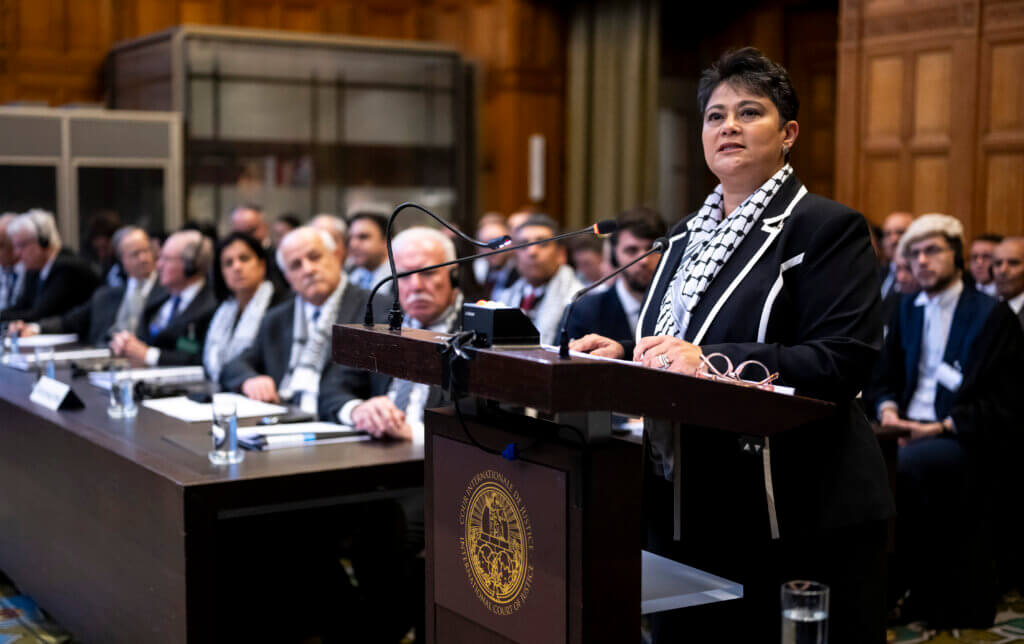
The core of the Advisory Opinion the ICJ has been asked to issue: whether or not Israel’s 56-year belligerent occupation of the Palestinian territories is legal, as occupations are defined under the Fourth Geneva Convention (1949) and customary international law.
In a Fall 2017 report to the UN Human Rights Council, then Special Rapporteur Michael Lynk weighed in on that question, presenting a four-part test. Israel failed, Lynk declared: a) by annexing portions of the territory it occupied in June 1967 (East Jerusalem and the Golan Heights); b) by failing to return the territory to sovereign Palestinian rule in a reasonable amount of time; c) by failing to act in the best interests of the Palestinian people (referred to under the Fourth Geneva Convention as a ‘protected people’); and d) by failing to act in good faith, “in full compliance with its duties and obligations under international law,” and as a UN member state.
Seconding Lynk’s observation in court today, American attorney Paul Reichler told the ICJ’s judges that a permanent occupation is a “legal oxymoron”; that “Israel’s 56-year occupation of Palestinian territory is manifestly and gravely unlawful,” and that “international law requires that [it] be brought to an end completely and unconditionally.”
Permanent occupation is precisely what Israel has in mind, Reichler told the court, citing insistence by Benjamin Netanyahu, Naftali Bennett, and other Israeli cabinet ministers that ‘Judea,’ ‘Samaria,’ the Jordan Valley, and all of Oslo Area C will forever remain a part of Israel.
“Under the umbrella of its prolonged military occupation,” Reichler said, “Israel has been steadily annexing the occupied Palestinian territory, and it continues to do so. Its undisguised objective is the permanent acquisition of this territory and the exercise of sovereignty over it in defiance of the prohibition on acquisition of territory by force.”
Having received Palestine’s arguments today, the court will hear those from 50 more states and three organizations (League of Arab States, Organization of Islamic Cooperation, and African Union) over the next week. The U.S., UK, Russia, and ten European states are among these.
In an apparently last-moment decision, Canada has opted not to deliver an oral ‘pleading.’ In a July 23, 2023, written statement to the court, however, Canada argued that the court should refrain from issuing an advisory opinion. The UN Security Council is ‘seized’ with the issue, the Canadian government says, and it is the best placed to resolve the conflict. An ICJ ruling would only polarize the situation, Canada says.
Washington’s position is even worse. The Biden administration denies Israel’s occupation is unlawful.
“This is truly stunning,” American attorney Paul Reichler told the court today. “Just how far in disregarding the international legal order will the United States go to exempt Israel from the consequences of its ongoing violation of peremptory norms, including the prohibition on acquisition of territory by force? Apparently, very far indeed.”
For Palestine’s Ambassador to the UN, Western contempt for international law is more than just stunning, it’s emotionally triggering. Delivering Palestine’s closing statements to the court, Riyad Mansour struggled for composure, then choked and paused for a few seconds.
“What does international law mean for Palestinian children in Gaza today,” Mansour asked, fighting back tears. “It has protected neither them, nor their childhood. It has not protected their families or communities. It has not protected their lives or limbs, their hopes or homes. We are a proud and resilient people that has endured more than its share of agony. It is so painful to be Palestinian today.”
Israel will shed no tears before ICJ judges. Having pleaded its case against genocide in mid-January (a remarkable event; never before has it submitted itself to the judgment of an international tribunal, much less the UN’s top court), Israel is taking a pass on these hearings. Advisory Opinion requests involve disputes between two state parties, Israel says. It’s not a party to any dispute, and Palestine is not a full UN member state.
The ICJ will wrap up its Advisory Opinion hearings a week from today. Then, it will be time to read. Over 15,000 pages of UN reports and resolutions have been submitted to it by the UN Secretary General, documenting the full spectrum of Israeli practices over 56 years of Israeli military occupation: ceaseless settlement expansion; the living conditions of the Palestinian people; the status of Palestinian natural resources and their right to self-determination, and the wider ‘Question of Palestine’ and ‘situation in the Middle East’.
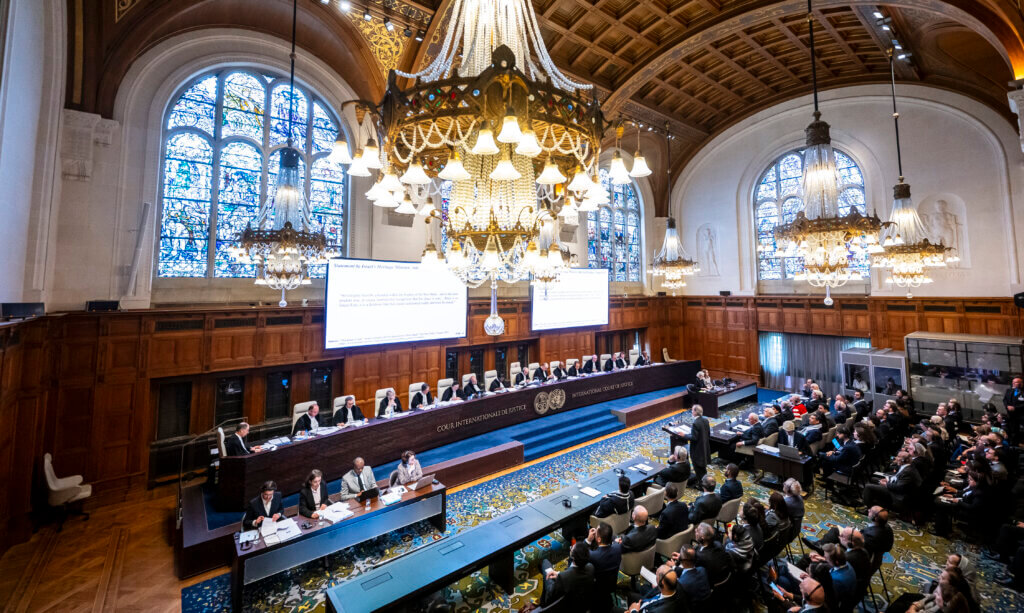
The ICJ is not obliged to render an Advisory Opinion on the extraordinarily documented narrative of Israel’s half-century occupation but is unlikely to refuse (notwithstanding requests it does so by Canada, the UK, and a few other Western states).
This will be the second time it rules on Israel-Palestine. In July 2004, it issued an Advisory Opinion on Israel’s Separation Barrier – a narrower issue than the questions it has just been asked to consider. Israel’s wall was illegal, the court ruled, in a 14-1 vote. Israel ignored the ruling. Its Western allies acknowledged the 2004 Wall ruling, but did not enforce it.
Still, Michael Lynk is hopeful.
“One should never be starry-eyed about what international law can achieve,” the Canadian legal scholar and former UN Special Rapporteur told Mondoweiss, standing on the steps of the court following today’s first Advisory Opinion session.
“But one should never be cynical about the aspirations of international law,” Lynk added. “At its very best, international law represents the very best in humanity. And I’d like to think that’s some of what we heard today: people striving for freedom; a long-held promise to them that’s gone on unfulfilled by the international community. And hopefully these hearings this week and the judgment when it comes in a couple of months time, will bring us that much closer to finding justice for the Palestinian people and a way to find a path for peace in the Middle East.”
Will Israel’s allies finally agree to hold Israel accountable for its actions, under international law, or will they continue to insist that the UN Charter, the Universal Declaration of Human Rights, and the Fourth Geneva Convention only ‘get in the way’ of a negotiated solution to what they refer to as the Palestine-Israel conflict?
“It was the Americans and the Europeans who set up the modern international legal system that we’ve had since the end of the Second World War,” Michael Lynk told Mondoweiss. “And when the colonial powers achieved their independence in the 1960s and 70s and 80s, they pushed that law further. And they said self-determination isn’t simply self-determination for European people … That’s what the Palestinians are asking for today at the court. When you stop and think about it, this is a 20th-century political problem that has drifted well into the 21st century. And it’s about time that the political order follows the legal demands of allowing self-determination for people they’ve long promised it to.”
David Kattenburg
David Kattenburg is a university science instructor and radio/web journalist based in Breda, North Brabant, the Netherlands.
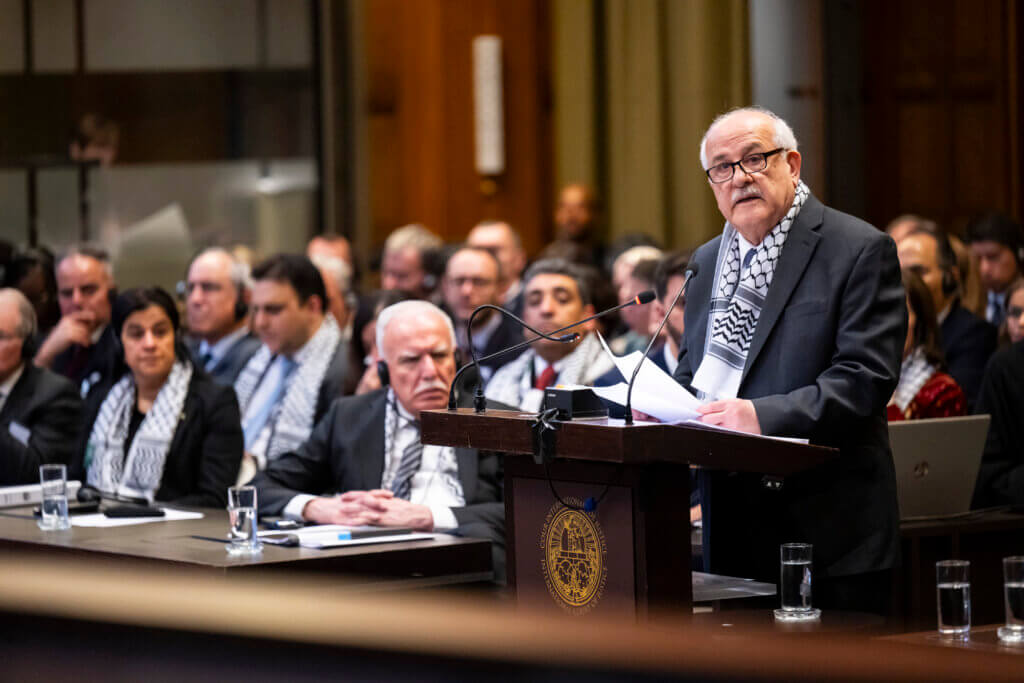

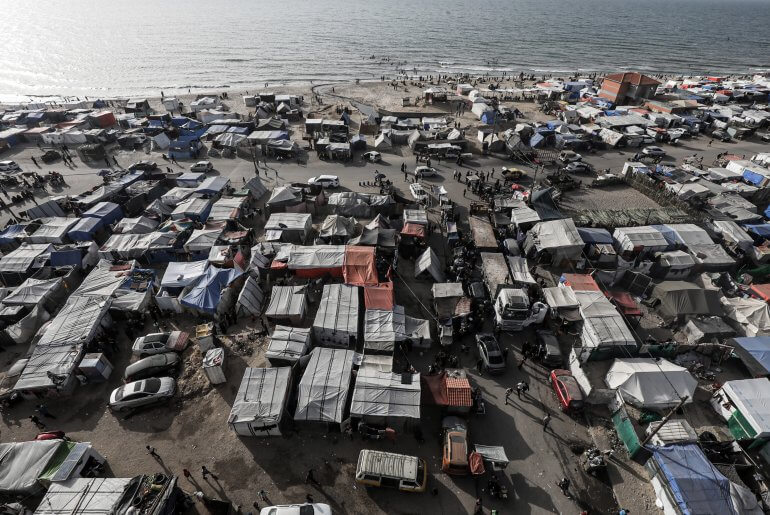
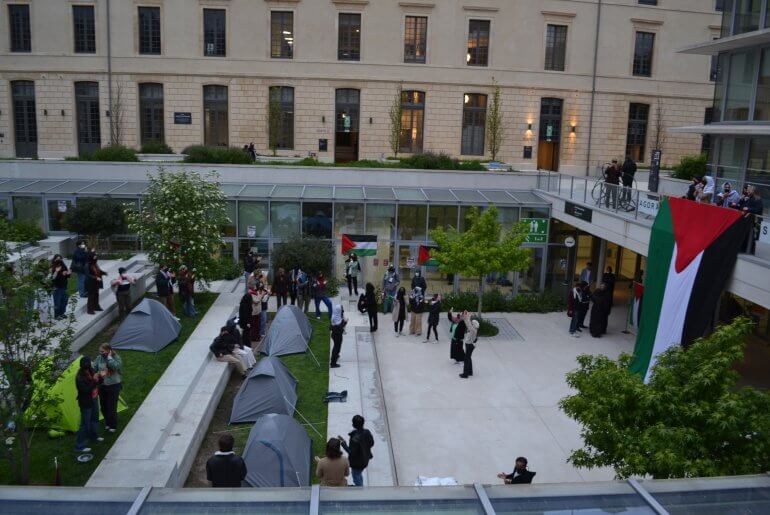
Where were the champions of “Palestinian self-determination” before 1967, when the West Bank and East Jerusalem were under Jordanian occupation, and the Gaza Strip under Egyptian “administration,’ which is a euphemism for occupation? In that year, Egypt tried to strangle Israel by closing the Strait of Tiran, which under international law is an act of war. Jordan and Syria aligned themselves with Egypt. Israel struck at all three nations, which is justified for a blockaded nation such as Israel was at the time. Egypt lost the Sinai Peninsula, the Gaza Strip, Syria forfeited the Golan Heights and Jordan lost East Jerusalem and the West Bank as a result of their unprovoked acts of aggression in blockading Israel and in issuing blood-curdling threats of massacre and annihilation against its Jewish population barely a generation after the Holocaust. Israel perforce acquired the Arab inhabitants of these territories, whom the surrounding Arabs and the Soviet bloc began calling “Palestinians.” On June 19, 1967, Israel offered to give up the Sinai and the Golan in exchange for peace. In response, at the Sudanese capital of Khartoum in late August of that year, the Arab countries refused to recognize or negotiate with Israel or to conclude peace.
Meanwhile, the custodians of the al-Aqsa Mosque in East Jerusalem offered Moshe Dayan the keys to the edifice but he turned them down and left them in charge. So much for the charge that the Israelis are trying to seize it. It’s taken them almost 57 years to get around to doing that.
Jordan refused to take back the West Bank in exchange for peace. Egypt got the Sinai back in the 1979 peace treaty, but refused to take responsibility for Gaza. The first Israeli settlers did not arrive in the West Bank until the mid-1970, and their population has only very gradually risen to 700,000 since then, over nearly 50 years. So much for an Israeli plan to annex the West Bank.
The Palestinian population of the territories, supposedly the object of genocide or attempted genocide, as risen from about 2 million in 1967 to 7 million today. If the Israelis genocide on their minds, they’d better study the records of the WWI-era Ottomans, the Nazis, the NKVD, the Khmer Rouge and the radical Hutus more carefully.
I present these facts on the very off chance that Mondoweiss’ readers include some people who are fair-minded and objective and who are willing to sift their way through the lying filth and venom, the relentless vilification and demonization hurled at Israel every day in these spaces.
Except it is not Palestinian territory, it is merely a territorial claim. Incidentally, neither the Israelis nor the Palestinians are a “racial group”.